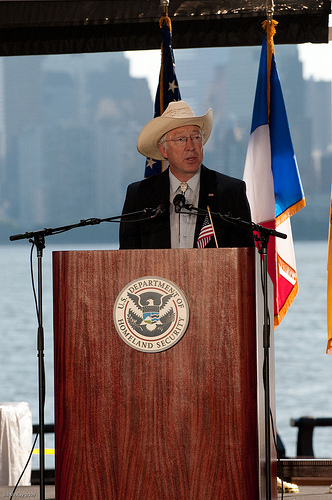The Obama administration expects to move forward with offshore drilling, but not without more strict rules on the oil and gas industry and not until officials are assured that the industry is operating safely, Interior Secretary Ken Salazar said Thursday. Salazar did not indicate when he will lift the temporary moratorium on new deepwater drilling—the subject of much political and legal contention in the months since the spill—though he affirmed the administration believes that offshore drilling will remain part of the energy portfolio.
“The fact is, we still need oil and gas from the Gulf of Mexico,” said Salazar in a speech outlining the administration’s overall energy policy. However, he said, the Deepwater Horizon explosion and spill “laid bare fundamental shortcomings in the oil and gas industry’s safety practices” in the Gulf.
Salazar defended the moratorium in his remarks: “The same people who fought regulation and oversight in the oil and gas industry have protested the suspension from the start. They want us to ignore the new reality and to go back to business as usual as if nothing had happened,” he said. “That’s not an option, and we won’t proceed on that front.”
At the same time, he indicated that the administration expects to green light additional drilling in the future. “There will always be risks associated with deepwater drilling. Nothing in life is without risks,” he said. But, he continued, “We will only lift the moratorium when I, as secretary of interior, am comfortable that we have significantly reduced those risks.”
Salazar also announced two new rules in the speech—the Drilling Safety Rule and the Workplace Safety Rule—which he said will reduce the risk of another disaster like the Deepwater Horizon. The first rule, drafted under the agency’s emergency rule-making authority, outlines proper practices for well cementing and casing and the use of drilling fluids—three major problems identified as potential causes of the Gulf spill. It also requires more oversight of blowout preventers, the mechanism that is supposed to shut the well in the event of an accident, and will require additional back up mechanisms. Drillers will also be required to have their plans reviewed by independent experts, Salazar said.
Salazar also announced that the agency is at last finalizing its “Safety and Environmental Management System” rule. The agency first proposed this rule, which would require oil and gas companies to develop new mandatory environmental planning procedures, more than a year ago, but the industry—most notably, BP—pushed back hard. The rule was in regulatory purgatory at the time of the Deepwater Horizon disaster.
Salazar also warned that oil and gas drillers should “expect a dynamic regulatory environment” in the future as well, with other new rules coming in the next weeks and months as his agency creates the framework for proceeding on offshore drilling. He acknowledged the significant “gap” between the technologies that allow companies to drill in deep waters and the technologies and regulations that would ensure they are doing so safely.













